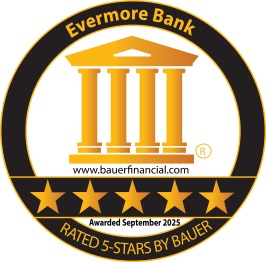Protect Yourself
Evermore Bank is committed to protecting your financial information.
It is equally important that you safeguard your information and your computer system as well. Criminals will always gravitate toward the easiest money. The more barriers that you can put into place, the more likely the criminal will go elsewhere. We strongly recommend that you read and use the following recommendations to stay as safe as possible online.
-
Manage Your PIN/Password Effectively: Make your Password as long and complex as possible. Do not use the same Password for every website that you visit; keep your online banking Password unique and do not share it with others. Use a different ID and Password for every online banking access you have. Do not email your Password or respond to an emailed request for your Password or other confidential information. We will never ask you to submit confidential information in an email. Never allow your computer or web browser to store your login names or PINs/passwords. Do not include your User ID in your Password and avoid predictable sequences of characters such as “1234” or “abcd” in your Password. Avoid dictionary words or names as they are vulnerable to automated password crackers containing multilingual dictionaries. We require that you change your Password every 90 days.
-
Use and Maintain a Reputable Antivirus Software Program: Some programs may be better than others in regard to a particular feature, but any one of them is better than no antivirus protection at all. Do not use any antivirus software that advertises itself via unsolicited email or pop-up windows. Configure the software to update its virus definitions daily.
-
Use a Software Firewall: If you are using Windows 10 or higher, enable the Windows Firewall. If you have a Mac, enable the built-in firewall.
-
Turn on Automatic Software Updates: This is a feature of some software which allows it to patch itself with very little effort from you. Make sure it’s turned on for your operating system, security software, and any applications that have the option.
-
Use Email Notifications and Alerts: Using our Alerts menu in the Options tab, configure alerts to notify you of items such as Incoming ACH Debits, Insufficient Funds, etc.
-
Email Phishing:
Phishing (pronounced: fishing) is an attack that attempts to steal your money, or your identity, by getting you to reveal personal information -- such as credit card numbers, bank information, or passwords -- on websites that pretend to be legitimate. Cybercriminals typically pretend to be reputable companies, friends, or acquaintances in a fake message, which contains a link to a phishing website. Take a close look at the email, if it looks suspicious it probably is. Look for spelling and bad grammar, urgency of the email, suspicious links or unexpected attachments.
-
Be Aware of Your Internet Surroundings: Learn to tell scams from real email, and when not to follow links or open a document. Simply clicking the wrong link or visiting the wrong website can allow a criminal to download malware (software that is meant to cause harm) such as viruses, spyware, adware, and Trojan horses. Malware can be annoying such as popping up a window to show you unwanted advertising, or as dangerous as snooping on the keystrokes as you type your online banking User ID and Password. Sharing files on jump drives can also spread computer viruses and malware. Download and install software only from websites you know and trust. Scan any downloaded files for viruses before you open them. Immediately delete email from unknown sources, before opening the email. Be very vigilante, remember all it takes is one click.
-
Ensure a Secure Connection When Using a Wireless Network: Accessing sensitive information over a non- secure network simply leaves the door open for criminals. Even if you aren’t visiting a site where you enter an ID and Password, you are still leaving your computer exposed to possible threats.
-
Log Out Properly: Always click on “Logout” at the top of the screen to ensure that no one with access to your computer can see your information or gain access to your accounts.




